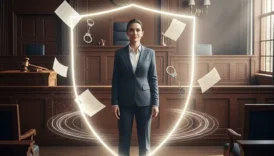What Is a Legal Injunction?

A legal injunction is one of the most powerful remedies available in civil law. It is a court order that requires a party to either take a specific action or refrain from certain conduct. Injunctions are often used to prevent harm, preserve rights, or stop ongoing violations when monetary damages alone would not be sufficient.
Simple Definition
A legal injunction is a court order that compels or restrains a person or organization from carrying out specific acts. Disobeying an injunction can lead to serious consequences, including fines or imprisonment for contempt of court. Injunctions can be temporary or permanent, depending on the circumstances of the case.
Real-Life Examples
- Property disputes: A court orders a neighbor to stop building on disputed land.
- Intellectual property: A company is ordered to stop selling products that infringe on another company’s patent.
- Environmental law: Courts may halt construction projects to prevent damage to protected areas.
- Harassment cases: A restraining order acts as a form of injunction, preventing unwanted contact.
Importance of the Term
- Prevents harm: Stops wrongful actions before they cause irreversible damage.
- Protects rights: Ensures individuals and businesses can defend their legal interests.
- Maintains fairness: Balances competing rights by controlling conduct.
- Immediate relief: Provides quick protection when waiting for a full trial would cause harm.
Comparison (Temporary vs. Permanent Injunction)
| Factor | Temporary Injunction | Permanent Injunction |
|---|---|---|
| Duration | Lasts until trial or further court ruling | Indefinite, after a full trial |
| Purpose | Preserves status quo during litigation | Provides long-term remedy |
| Standard | Requires showing of likely harm | Requires full proof at trial |
FAQ
1) Who can request a legal injunction?
Any individual, business, or organization seeking to prevent harm or enforce rights.
2) How quickly can an injunction be granted?
In urgent cases, courts may issue temporary injunctions almost immediately.
3) What happens if someone ignores an injunction?
They may be held in contempt of court, facing fines or imprisonment.
4) Are injunctions always permanent?
No. Many are temporary until the court decides the case fully.
5) Can injunctions apply to businesses?
Yes. Companies can be ordered to stop certain actions, such as unfair competition or illegal activities.
Closing
A legal injunction is a critical tool for protecting rights and preventing harm. By compelling or restraining conduct, it ensures fairness and provides remedies when money alone cannot address the problem.






